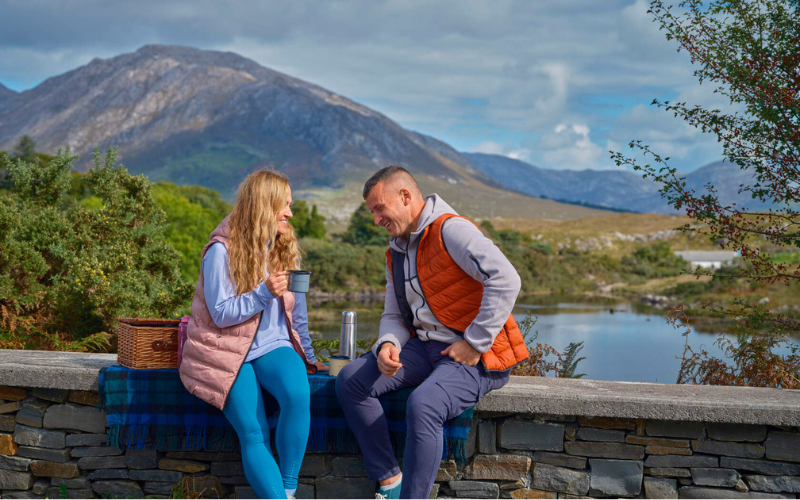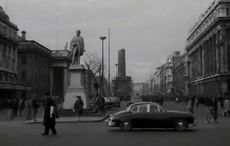That summer we took a holiday in Donegal Town. It was 50 miles from where we set out to our destination, but it seemed to take us all day to get there along the endlessly winding roads.
I was a child and it was the 1970s, so the roads were windier, as was the pace of life. In my memory now I recall that trip as a week of blue skies and shimmering haze. I especially remember the drive though the mountain landscape that rose up after Ballybofey, dividing my northern Donegal peninsula from the south east of the county.
Before we had set out in our old jalopy my grandmother had thrown holy water over us and the car. It was only a short drive from point to point, but she had acted like we would be climbing the Matterhorn.
It was such an Irish thing, her total mistrust of fate. You had to guard against disaster with prayers and holy offerings, her actions told us. Because nothing stood between you and ruination, certainly no good awaited you outside your own gates.
I suppose it was because my grandmother was a Civil War bride. Her husband, my grandfather, had been involved. She had seen the British soldiers line him up against a wall and threaten to shoot him.
Her grandparents had lived through the Great Hunger years. Anxiety was her lifeblood.
But I think I recall this particular trip because my father was in a sweet temper, which was rare for him. I remember that at one point he even hummed a little tune, which was miraculous. Something was pulling him toward this holiday and toward life again. I was curious to discover what it was.
When we arrived in Donegal Town we parked in front of the biggest hotel on the town square. There may have only been one hotel, I don’t recall. They gave us rooms with a view overlooking the bay. The tide was out. There was a seaside aroma of salt and seaweed wafting up from the shore.
At the time my older brother wasn’t a fan of unusual things. Unusual food, unusual settings, unusual me. To combat my cooties he had insisted on his own room, and being the eldest he was indulged. But then he had become unexpectedly queasy from the sea air and had decided to stay in bed that afternoon. After a brief discussion that left my father and I to explore the town on our own.
We stepped out of the dark foyer into the afternoon sunlight. I took my bearing and looked around.
As a boy I was rail thin and otherworldly, only lightly tethered to the earth. But I had a spirit of adventure that made me curiously fearless, a contradiction that my father had noticed before anyone else.
In particular I liked to look at things and people until they revealed themselves. It got me into trouble with children and adults.
Today, though, I was in a new place and on my best behavior. There would be no epic staring contests. Instead of looking at others I’d be looked at myself.
In Donegal there is a long tradition of tweed-making. It is world famous for its quality and strength. My father had planned to have a suit measured in a local shop that afternoon so I milled about as the tailors took out their tapes and pins. There were blazers and ties and hats and scarves and gloves and shorts and waistcoats wherever I turned. But a glass case filled with colored socks really caught my eye.
My mother had died young, I had no sisters, so it had never occurred to me that socks could come in purple. My hand reached out.
As I did I heard an intake of breath that made me turn around. Glaring at me was an old shop woman in her sixties. She wore wire rimmed glasses and an expression of total contempt.
I looked at her looking at my seven year old self, then I looked back at the purple socks in my hands.
“I want these, Daddy,” I said to my father. He had already noticed my propensity for the strange.
“Where did you get them?” he asked me and I pointed.
“Over there by the lady,” I said.
He looked over at her, she blinked back at him. After he paid for his suit he turned to her. “How much for these?” he said simply.
The avalanche fell. “Those are for girls!” she scoffed. “They’re girls colors. They’re not boy’s colors. Boys don’t wear them. They’re not for boys. They don’t fit.”
My father looked at me. He could see I was resolute.
“How much are they?” he asked again, a little more pointedly. Stunned into silence she wrapped them up.
Shame has many uses. In Ireland in the 20th century it was used to manipulate and control, it was used to wound and maim, it was used to isolate and silence.
But it only worked if you actually felt ashamed. The whole system crashed if you shrugged it off.
She had never met a double act like us. We were grinning at her like school boys. I still fondly remember her angry speechless face.
In memory of her disgust I still like to wear purple socks sometimes. But I do it in memory of my father too, to remember a great happiness that passed between us once. Long ago in the 1970s, when he showed what it meant to be a man.




Comments